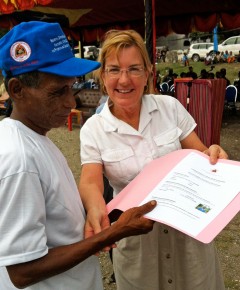Location
About Us
We envision a world in which land governance systems, both formal and informal, are effective, accessible, and responsive for all. This is possible when land tenure and property rights are recognized as critical development issues and when the United States Government and its development partners demonstrate consistent attention and a firm commitment to supporting coordinated policies and programs that clarify and strengthen the land tenure and property rights of all members of society, enabling broad-based economic growth, gender equality, reduced incidence of conflicts, enhanced food security, improved resilience to climate change, and effective natural resource management.
Mission Statement
The USAID Land Tenure and Resource Management (LTRM) Office will lead the United States Government to realize international efforts—in accordance with the U.S. Government’s Land Governance Policy—to clarify and strengthen the land tenure and property rights of all members of society—individuals, groups and legal entities, including those individuals and groups that are often marginalized, and the LTRM Office will help ensure that land governance systems are effective, accessible, and responsive. We will achieve this by testing innovative models for securing land tenure and property rights and disseminating best practice as it relates to securing land rights and improving resource governance within the USG and our development partners.
Members:
Resources
Displaying 201 - 205 of 440Addressing Large-Scale Land Acquisitions in Tanzania
This article focuses on recent policy changes implemented by the Government of Tanzania. The Government has been criticized in local and international media for supporting harmful large-scale land acquisitions. In response, policy makers have placed a cap on transfer size: investors can acquire no more than 10,000 hectares for sugar production and no more than 5,000 hectares for rice production (two key agricultural commodities in the country). But will a cap stop harmful transfers? Maybe, but caps are not necessarily the “major step” that the article suggests.
Colombian Peace Talks Hinge on Land Issues
According to a recent article from Reuters AlertNet, land is the first issue on the agenda at the historic peace talks in Cuba between the Government of Colombia and the Revolutionary Armed Forces of Colombia (FARC). Unequal land distribution is a factor in Colombia’s decades-long internal conflict. If the current peace negotiations are to succeed and Colombia is to achieve enduring peace and stability, land issues must be addressed.
USAID Assists Timor-Leste in Developing Land Policies, Ending Conflict
A nation formed just 10 years ago, Timor-Leste struggles to overcome complex challenges of land ownership and use rights that were created under Portuguese and Indonesian rule. Competing land claims between individuals, and between individuals and the state, are quite common and occasionally result in armed conflict and deaths. Complicating the problem is the absence of a property rights legal framework in which to address land matters.
Women's Land and Inheritance Rights in Afghanistan
On December 15th, USAID and the Afghanistan Ministry of Women’s Affairs (MOWA) launched a nationwide public information and awareness campaign about Afghan women’s rights to inherit and own land and property. The campaign is part of USAID’s Land Reform in Afghanistan (LARA) which works with the Government of Afghanistan to build the local capacity necessary to design and implement transparent, effective land tenure reform.
Cambodia: Regional Agricultural Trade Environment (RATE) Assessment Country Summary
Although Cambodia is one of Asia’s smallest and poorest economies—in the Association of Southeast Asian Nations (ASEAN) only Burma’s per capita purchasing power is lower—changes in its environment for business and trade since the turn of the millennium have been rapid and dramatic. Insiders and outsiders alike are increasingly recognizing the country’s economic potential as a range of new investment and infrastructure projects evince growing confidence and opportunity.




